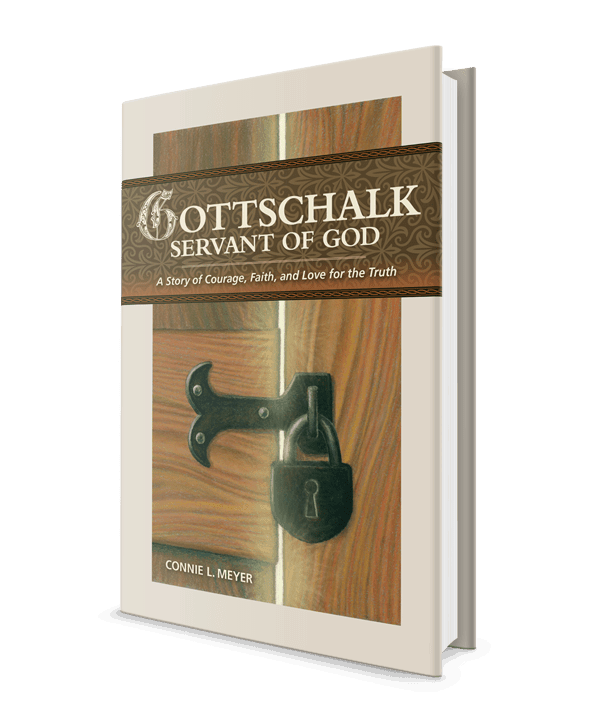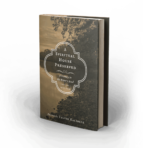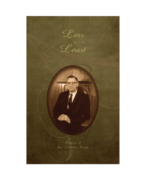Those were the Dark Ages, the days of knights and castles and kings and queens, of monasteries, Vikings and monks. But one monk stood out from all the rest. One monk stood firm for the truth. This is the story of Gottschalk of Orbais, a light of truth in the darkness of his age—a light of truth in ours.
For several years the RFPA has discussed publishing books for younger readers and Gottschalk: Servant of God represents our first effort. This book is intended for high school ages. Because the story is intriguing and the history of Gottschalk is not well-known, adults will also enjoy this book and find it profitable.
“I’ve found [the biography of] Gottschalk very encouraging. How wonderful that the Lord kept him faithful though standing alone and imprisoned for nearly 20 years!” – W. Yorkshire, England
“What a beautifully produced book this is!” – Leicestershire, England
I’ve enjoyed reading Gottschalk: Servant of God. Gottschalk was a great Christian, who stood alone for sound doctrine – Lincoln, England
Listen to the audio of a lecture on “Gottschalk: Medieval Confessor of God’s Absolute Sovereignty.”
Watch the video of a lecture “Gottschalk: Medieval Confessor of God’s Absolute Sovereignty” and its Q. & A. session.
Book Review
Published in the English Churchman (15 & 22, April 2016)
This helpful little book was recently published by Reformed Free Publishing Association (RFPA) based in Michigan, USA. I had never heard of Gottschalk before and what a treat and tonic I had to read about his life. In a day when even orthodox Calvinistic thinkers are watering down their message to present a more palatable presentation of the gospel, this book is an antidote to such conduct. Even more surprising is a clear defence of the twin doctrines of election and reprobation from a Benedictine monk in the 9th century. The Westminster Confession does state in Chapter 3 section 8 that the doctrine of predestination is to be handled prudently and carefully but this chapter of the confession clearly proclaims the doctrines of election and reprobation.
Gottschalk was born around 806 in Saxony into a high ranking family. However, this child was born the “The Dark Ages” and the state of Christianity was very poor. His parents donated him to a monastery along with his inheritance. Any student of the Roman Catholic Church knows how the people can be manipulated form money in return for eternal security. However God, in his providence, had different plans for Gottschalk.
The book charts the life of Gottschalk through his monastic training and then his public church life, where he made the most audacious stand for sovereign grace. We are presented with a young man who was soaked in the Scriptures and the church fathers, especially Augustine. We trace a line that flows from the apostles to Augustine to Calvin in the clear presentation of election and reprobation. When in attendance at the Synod of Mainz in 829 (when he was approximately 23!), he set out his confession of faith as follows:
I, Gottschalk, believe and confess, profess and testify, from God the Father, through God the Son, and in God the Holy Spirit, and affirm and assert before God and His Holiness that predestination is double whether of election to peace or of reprobation to death. Because just as God, by free grace, has unchangeably predestined all His elect to life eternal, so likewise (similiter) the same unchangeable God by just judgment has unchangeably predestinated all the reprobate, who in the day of judgment are damned on account of their evil merits, to merited eternal death” (p. 75).
What a clear statement of truth from a Roman Catholic monk! He would shame the vast majority of Protestantism today. Note also his tender age. We are said to expect too much of our young people but in reality we expect too little. Gottschalk is an example of how young men can be fully theological literate when they truly desire the truth.
Gottschalk was harassed, silenced, beaten and imprisoned for his faith, and died defending sovereign grace. Just like today, “Calvinist” church men stated they were Augustinian in doctrine but then taught predestination, like Gottschalk’s foe Hincmar, in language which is not distinct or clear and with no room for reprobation. A synod at Quierzy declared Gottschalk a heretic. He was flogged within an inch of his life so that his blood stained the ground and he was forced to throw his writings in the fire. He was led bleeding, bruised and wounded to a prison room. Even as he was dying, Hincmar tempted Gottschalk to water down his views with the promise of the sacraments and a Christian burial. However, he did not bend. In the final chapter of the book, it is put as follows:
Gottschalk knew that long ago in eternity God had chosen him to be an elect of God in Jesus Christ for no other reason than that God wanted to. By himself Gottschalk was only a man, a sinner like everyone else. He knew that. The reason for election is in God alone. Gottschalk knew that too. God does not change his decrees. Gottschalk knew the devil cannot steal one elect out of God’s hand. Even locked away in his prison cell, Gottschalk knew the devil could not steal him. His election and salvation was sure. His path in this life was sure. His place in heaven was sure. In that knowledge Gottschalk could die for the truth he loved (pp. 121-122).
Gottschalk died around 868. He gave his life and death for sovereign grace. Oh, for men like this today who will stand for orthodox truth instead of saying you can be a Calvinist but preach like an Arminian! I strongly recommend this book. It is an easy read which would not challenge teenagers. We need to hear the truth and this is a superb introduction to election and reprobation.








